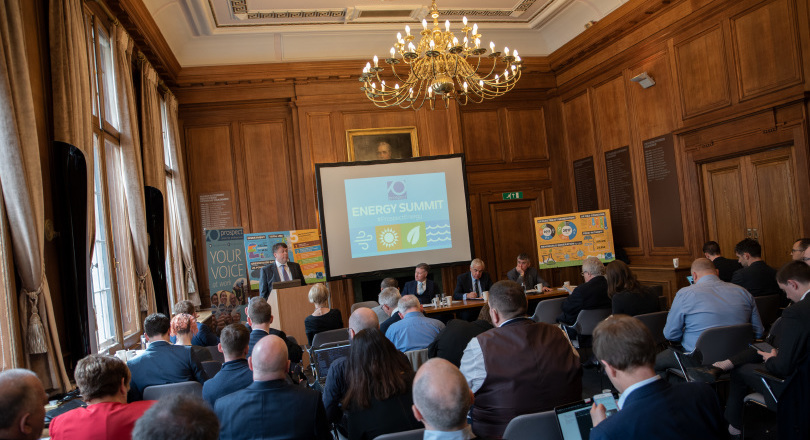The session was chaired by Basil Scarsella, CEO, UKPN and the panellists were:
• Alan Brown MP, SNP spokesperson for energy
• Jon Phillips, director of corporate affairs, Global Infrastructure Investor Association
• Mike Clancy, Prospect general secretary

Above: Basil Scarsella
Mr Scarsella opened the session by asking the audience if there was a similarly sized country in the world that has a better energy policy than the UK?
“We should continue to look at ways of improving and regulation needs to evolve but you don’t need to fix something that isn’t broken,” he said.
“We should be careful not to make political progress out of energy policy, if it just means point scoring between the parties.”
Infrastructure and investment
Jon Phillips of the Global Infrastructure Investor Association represents more than 50 leading investors from around the world, such as pension funds, insurance companies and sovereign wealth funds.

Above: Jon Phillips
The GIIA had recently published research that showed around 111 UK pension funds, representing more than 8m pensions savers, are invested in UK energy infrastructure, which had been privately funded to the sum of £170bn over the last 35 years.
While pointing out that the UK energy sector had been positively transformed in the last few decades, Mr Phillips also pointed towards to some of the challenges ahead.
“Forecast suggests we’re likely to need the same level of investment we’ve seen in the last 30 years, invested again by 2030 if we're going to keep pace with the radical change and transformation that the industry is going through,” Mr Phillips said.
“Infrastructure has to be paid for, whether it is through central taxation or through customer bills. Either way, it's largely the same people: you and me.”
“It's our view that the future energy policy for the UK must ensure that private capital continues to play a fundamental part in meeting the UK's future energy needs. The public sector provides the right policy and regulatory framework, but the private sector is best able to deliver the long term commitment to investment, improved performance, innovation and customer focus.”
The view from Scotland
Offering this analysis on UK energy policy, Alan Brown MP, began by pointing out the ‘revolving door’ that had seen around 20 energy ministers in a 20 year period, ‘which is clearly not conducive to long-term energy policy.’

Above: Alan Brown MP
He argued that energy policy needed greater prominence within government and pointed out the Department of Energy and Climate Change had been rolled into Department for Business, Energy & Industrial Strategy in July 2016.
Mr Brown MP said: “The UK needs to have a proper long-term strategy and framework. There needs to be enough clarity for investors but it must be flexible enough for emerging technologies and changes to how the market operates.”
“We need to ask: what do we need? How do we deliver it? Where are different technologies best suited across the UK? That way we can start to plan and redesign the national grid. We need a blank piece of paper and start again.”
He contrasted the political instability in Westminster with the situation in Scotland, where the SNP has been in power since 2007, twice in minority governments, where it has needed to work cross-party.
“That has led to greater stability and we have now got an energy strategy, which sets clear renewable targets across transport, heat and power. It sets consumption targets and it sets productivity targets. These are all good for underpinning government policies going forward.”
Mike Clancy’s opening statement can be read here.

